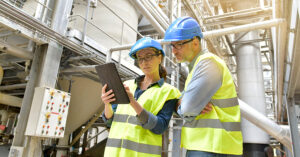Choosing the right baler is critical for businesses aiming to streamline recycling operations and maximize efficiency. The decision often boils down to a key consideration: manual vs automatic balers.
While both types of balers have their advantages, the best choice depends on your business’s unique needs, budget, and goals. This article will guide you through understanding the differences, benefits, and limitations of manual and automatic balers, ensuring you make an informed decision.
Understanding Manual Balers
What Are Manual Balers?
Manual balers are straightforward recycling machines designed for businesses with smaller volumes of recyclable materials. These machines require manual loading, compression, and tying of materials. Commonly used for cardboard, paper, and light plastics, manual balers are a practical choice for businesses with lower recycling demands.
Benefits of Manual Balers
Manual balers offer several advantages, making them an attractive option for smaller businesses:
- Cost-Effective: With a lower upfront investment, manual balers are budget-friendly for companies just starting with recycling.
- Compact Design: These balers are typically smaller and more space-efficient, fitting into facilities with limited room.
- Simple Maintenance: With fewer mechanical components, manual balers are easier to maintain and repair.
- Flexibility: Ideal for businesses with varied and low-volume recycling needs.
Limitations of Manual Balers
Despite their benefits, manual balers have some drawbacks:
- Labor Intensive: The need for manual intervention can drive up labor costs and slow down operations.
- Lower Throughput: Manual balers are not designed to handle large volumes of recyclables, limiting their efficiency.
- Inconsistent Bale Quality: The quality of bales depends on the operator’s skill, leading to potential variability.
Understanding Automatic Balers
What Are Automatic Balers?
Automatic balers represent the next step in recycling technology, automating the processes of loading, compressing, and tying materials. They are designed for high-volume operations and can handle a wide range of materials, including dense or hard-to-compact items.
Benefits of Automatic Balers
Automatic balers bring a host of advantages, especially for larger businesses:
- High Efficiency: These balers can process substantial volumes in significantly less time than manual models.
- Labor Savings: Automation minimizes the need for manual intervention, reducing labor costs.
- Consistent Bale Quality: Automatic systems ensure uniform and high-quality bales, regardless of the operator’s experience.
- Advanced Features: Many models include conveyors, sensors, and integrations with facility management systems for seamless operation.
Limitations of Automatic Balers
However, automatic balers are not without their challenges:
- Higher Initial Investment: They come with a higher upfront cost, which may not suit businesses with tighter budgets.
- Space Requirements: Automatic balers are larger and require more space for installation and operation.
- Complex Maintenance: Their advanced systems may necessitate specialized servicing, leading to higher maintenance costs.
Factors to Consider When Choosing
Volume of Materials
The volume of recyclables your business generates is one of the most important considerations. For businesses with low volumes, manual balers are often sufficient. However, for operations producing significant amounts of waste, automatic balers are far more efficient.
Material Type
The type of materials you recycle also matters. If your waste stream includes dense or hard-to-compact materials, an automatic baler may be better suited to handle the load.
Labor Availability and Costs
Consider the labor resources available to your business. If hiring staff to operate a manual baler is cost-prohibitive, the reduced labor demands of an automatic baler might justify the higher initial investment.
Space Constraints
Evaluate the available space in your facility. Manual balers are compact and better suited for businesses with limited room, while automatic balers require more space for their larger footprint.
Budget
While manual balers have a lower upfront cost, automatic balers can provide significant savings in labor and operational efficiency over time. A cost-benefit analysis is essential to weigh immediate versus long-term expenses.
Future Growth
Anticipate your business’s growth. If your recycling needs are expected to increase, investing in an automatic baler now may save costs associated with upgrading later.
Use Cases for Manual and Automatic Balers
Industries Best Suited for Manual Balers
- Small retail stores and local shops.
- Offices and businesses with low recycling volumes.
- Small-scale warehouses handling minimal amounts of recyclables.
Industries Best Suited for Automatic Balers
- Large retail chains and supermarkets with continuous waste streams.
- Manufacturing facilities and recycling centers processing high volumes.
- Distribution centers with diverse and extensive recycling needs.
Making the Final Decision
To choose the right baler, consider conducting a comprehensive cost-benefit analysis. Look at factors such as lifecycle costs, labor savings, and space requirements. It’s also beneficial to consult with an expert who can provide insights specific to your operations. Finally, ensure your choice aligns with local recycling regulations and your sustainability goals.
Why Choose Nanoia Recycling Equipment?
At Nanoia Recycling Equipment, we understand that every business has unique recycling needs. That’s why we offer comprehensive solutions tailored to your operations. From initial consultation and design to installation, financing, and repair, our team is here to support you every step of the way.
With our expertise in balers, compactors, and crushers, we can help you determine whether a manual or automatic baler is the right fit for your business.
Contact Nanoia Recycling Equipment to discuss how we can optimize your recycling processes.
Conclusion
Selecting the right baler—manual or automatic—can significantly impact your business’s efficiency, labor costs, and overall ROI. By carefully evaluating your needs and consulting with a trusted partner like Nanoia Recycling Equipment, you can make a choice that supports both your current operations and future growth.






